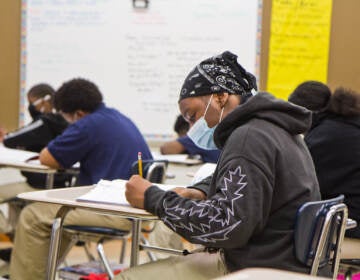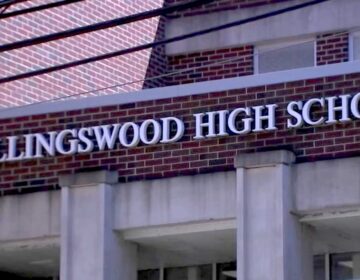Mayoral hopefuls debate education at South Philly elementary school
ListenThe Democratic candidates for Philadelphia Mayor debated perhaps the most important issue in this years race Tuesday night: public education.
I had the pleasure of moderating what became a pretty lively event, held before a large crowd in the auditorium of G.W. Childs elementary school in South Philadelphia.
Five of six candidates attended: state Sen. Anthony Williams, former City Councilman Jim Kenney, former Common Pleas Court judge Nelson Diaz, former state Sen. Milton Street (brother of John Street, former mayor), and former Philadelphia Gas Works vice president of communications Doug Oliver.
Former District Attorney Lynne Abraham originally confirmed attendance, but later dropped out.
With the Philadelphia School District’s asking for another $103 million dollars from the city, the first question posed was whether the candidates would fulfill that request.
All candidates said “yes,” but all said they opposed Mayor Michael Nutter’s plan to do so by raising the city property tax by 9.3 percent.
Kenney, who recently retired from city council this winter after 23 years, gave this rationale for opposing Nutter’s plan:
“People just went through a terrible AVI experience and they should not have to be backed up again with a 9.3 percent real estate tax increase. And I would also wait to see how successful Gov. Wolf is, so that number may be a moving target. So let’s not jump the gun.”
Candidates offered an assortment of ways to generate that funding without a property tax increase.
Milton Street talked about selling city assets, such as PGW. Doug Oliver mentioned getting the city’s nonprofit universities to pony up payments in lieu of taxes. Sen. Williams referenced revenue from the city’s land bank initiative, but no one gave a detailed accounting of things that would add up to the recurring $103 million in Nutter’s plan.
Here was Nelson Diaz’s response:
“I would then look at whether or not we could change the tax structure in which we impose more of our real estate tax burden on the commercial property, instead of the residents having to pay the same per capita tax that the commercial businesses do,” he said. “The taxes are such a burden on the working class, that we have to change the wage tax.”
Much of the debate in recent years in Philadelphia’s education landscape has been about the role of public charter schools. The candidates did separate themselves somewhat on the issue.
Street and Diaz were the most skeptical of charters. Kenney, the teachers’ union favorite, said he’d be more supportive if Harrisburg returned the charter-reimbursement line-item that helped districts defray their costs. It was eliminated by former Gov. Tom Corbett.
Oliver and Williams both said the real focus should be on school quality, not school type.
Sen. Williams, who has the backing of a wealthy trio of school choice advocates, grew exasperated with Street’s and Diaz’s attacks on the charter sector.
“I am exhausted on our time spent beating up on a type of school. Why are we not focusing on good schools? We need to be honest. These children are suffering. These families out here are suffering. And we’re pandering to one group versus the other, and I refuse to do that,” said Williams. “Charters, publics, magnets — all of them should be part of the public school experience. And we need to stop beating up on one type. And face the facts: we need to fix them all and fund them all.”
Oliver was probably the most insistent that all of Philadelphia’s city agencies should be thinking about ways to improve Philadelphia’s educational opportunities.
“We should look at our $3.9 billion dollar city budget through the lens of how we educate our kids. And in that case, you look and you say, ‘how do you have a health department, without having nurses? And how do you have a DHS without having counselors.'”
Many of the candidates referenced Gov. Wolf’s ambitious budget agenda that would give Philly schools a major financial boost, while acknowledging the difficulty that plan will face in the Republican-held legislature.
Most of the candidates presented a plan for how they’d act as diplomats in Harrisburg for increased education funding.
Most notably, though, was that fact that Milton Street didn’t.
On this question, like on many throughout the evening, his answer revolved around race.
“So we got to go to Harrisburg — and I’m going to put it right on the line — and ask white legislators to give their white taxpayers dollars to Philadelphia to educate some black and Hispanic children? It’s not going to happen,” Street said. “Come on people, wake up and taste the veggie burgers.”
Oliver talked about the importance of being able to see the Philadelphia situation from the inside the shoes of rural lawmakers.
Diaz talked about leading a delegation of urban mayors across the state.
As a longtime senator, Williams has been in the middle of these types of negotiations for years. He cited his track record as proof that he’d have success moving forward. As lead sponsor of two pieces of enabling legislation (the Philadlephia cigarette tax and the city’s recent sales-tax extension), as well as his role bringing schools $45 million in one-time cash in 2013, Williams says he’s given the district $250 million.
“It was my legislation,” said Williams. “It’s mine. So I take credit for it.”
Kenney stressed that Philadelphia politicians need to have a unified voice – emphasizing that, unlike Mayor Nutter, he and council president Darrell Clarke would travel to the capitol in the same car.
Here, an exchange between Street and Kenney evoked one of the crowd’s biggest responses of the night.
“Why would he need to go to Harrisburg as mayor? We send people to Harrisburg?!” said Street.
“I’m glad you’re not going to go,” said Kenney to raucous laughter, “because I don’t think it’d be helpful.”
The candidates still have plenty of time to inform voters about their education platforms.
The primary election will be held on May 19. Next Tuesday, another mayoral education forum will be hosted by students at Central High School.
Video from Tuesday’s event will be broadcast on PhillyCam on Saturdays at 3pm in April and May.
WHYY is your source for fact-based, in-depth journalism and information. As a nonprofit organization, we rely on financial support from readers like you. Please give today.




